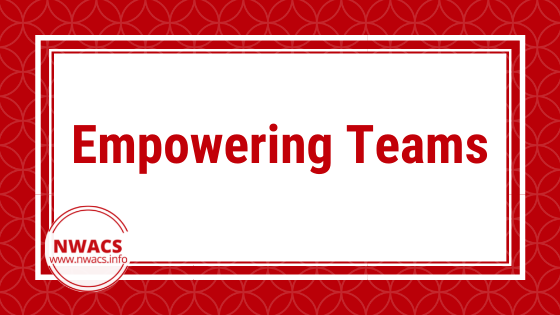by Penny Tonn, MS, CCC-SLP (Speech-Language Pathologist); NWACS Contributor
Many are familiar with the adage that “it takes a village”. This statement is certainly true when offering support to AAC users and their support systems. Teams can include:
speech-language pathologists,
teachers,
occupational therapists,
peers,
parents or caregivers,
advocates,
the AAC user,
and more.
Each individual on the team has a special expertise to offer. Creating an interconnected and supportive team takes thoughtful planning, networking, and humility.
What can we as support systems do to empower others within the support circle? Here are a few ideas to help you work together with teams to provide the most effective support for an AAC user.
Empowering Professionals
Each professional has specialized training in a certain area. We could not be effective without the knowledge and expertise of
vision specialists,
motor specialists,
speech-language pathologists,
educators,
and the many others who provide expert support to individuals with complex communication needs.
Providers can reach out to others on the team to get expertise and insight into a specific area of need. Here are a few strategies:
Get appropriate release of information and consent, then connect with others. Ask specific questions about how to support the AAC users skills that are beyond your scope. For example, if motor skills make AAC use difficult, ask the physical therapist, occupational therapist, or vision specialist about body or device positioning that can help avoid undue strain or stress.
Share information that has been meaningful during your interactions with the AAC user. Perhaps you have found a motivating topic, such as looking at pictures of a favorite animal habitat or watching weather events on the news. Share this with others on the team so everyone can build strong and meaningful social interactions with the AAC user. Share the words that you have used during discussions.
Share your knowledge! If you are the SLP on the team, give your input on language modeling using AAC. Remember the importance of communication - it is how we connect! Share your intricate knowledge of linguistics or any other key skill set you bring to the table.
Ask questions and engage in active listening. We have so much to learn from each other!
Empowering Caregivers and Peers
Professionals are just one element of the support system. The most impactful support system is the families, caregivers, friends, and peers. These folks spend much more time with the AAC user. A good amount of attention should be paid to their role in supporting the AAC user.
Find opportunities to connect and motivate! Families and caregivers know best what motivates the AAC user in their life. Work together to find out what is motivating. Give caregivers coaching and support in modeling language using AAC.
Provide coaching to parents in how to model meaningful language during motivating situations. Help families make AAC use a part of their daily lives throughout the day with modeling. Teach words that are meaningful in these situations. Help caregivers use communication systems.
Help caregivers access resources. There are many resources available for disabled people and their families. If a particular resource may be of interest to a family, guide them to it. This may include connecting families with specialty providers or support groups.
Encourage families to get involved with parent advocates and self-advocates. Finding a group of people with similar experiences can help caregivers navigate challenging processes, like insurance, education, or vocational planning. They can also give parents a sounding board to discuss their thoughts and feelings.
Empowering AAC Users
At the heart of AAC, is the user! The AAC user should be at the center of all discussions of AAC use and their empowerment is of the most importance!
AAC users have a right to communicate their thoughts, feelings, and ideas! We can empower AAC users at all levels of development by listening and observing their communicative behaviors. Rather than assuming what an AAC user may be trying to convey, we can offer language through modeling. Provide opportunities for the AAC user to communicate, not expectations!
Share the Communication Bill of Rights with the AAC user and all team members. Allow the AAC user autonomy of their body and existence. Support them in communicating their thoughts and experiences.
Provide robust and rich communication experiences by modeling language. Provide access to robust language so the AAC user can communicate a variety of thoughts and ideas beyond requesting!
Support AAC users in becoming self-advocates. Connect AAC users with networks that promote self-advocacy as well as connecting with other AAC users. Check out this post by PrAACtical AAC for more tips on self advocacy avenues: 5 Ways to Support Self-Advocacy in AAC Learners.
Listen to the lived experiences of AAC users and learn from them! Give power to their communication - they are the experts of being AAC users!
Empowering teams requires all parties to listen and learn from each other. Engage in active listening and work together to provide a holistic support system for AAC users and their families!
What resources have you found useful in empowering AAC users and their support systems? Let us know in the comments or on the NWACS Facebook page!


